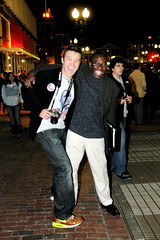The First Time You Ever Heard of the RIAA
The Recording Industry Association of America, the trade group of the music industry, has been around for 58 years, founded in part to create open standards for vinyl playback so that everyone’s records would play on everyone’s record player. In general, it has come to manage the part of the music industry where the industry needs to cooperate. Here’s it’s mission in a nutshell, from the website:
…the RIAA works to protect the intellectual property and First Amendment rights of artists and music labels; conduct consumer, industry and technical research; and monitor and review state and federal laws, regulations and policies.
Like many trade groups, you’d almost certainly never heard of it. Heard of the Metal Roofing Alliance, or the Professional Liability Underwriting Society? Probably not, and there’s so many more. To know all of these groups you’d either have to be a professional conference organizer or a lobbyist, and that knowledge isn’t the sort of thing you’d drop at cocktail parties to look impressive. No one knows about trade groups because no one cares about trade groups.
What turned the RIAA into a household name was an internet application named Napster. Napster was many people’s first exposure to file sharing, especially of the peer to peer variety. It was that peer to peer aspect that made the difference. Napster was the first great collection of music (on or off the net) that was completely uncurated and open to all. Music was free, easy, and didn’t require putting on clothes to get. Discovering new music was easier than anyone could have imagined. Type in a favorite- in my case, for instance, Ani Difranco, and browse through other Ani fans’ libraries. This led me to a decade long love of Utah Philips, and the strange pride of making the discovery myself. I hadn’t relied on anyone to tell me about new music, and I hadn’t had to go out and spend (much) time and money discovering a jewel in the rough. I never even had to leave the house to develop my musical taste. With Napster, I happily reported to friends, it wasn’t so much that I could get tons of popular music for free, it was that my musical taste itself improved.
Some new bands and musicians began to see how this could help them from the other end. Get into a few libraries and get discovered, not by an A&R man but by a fanbase, one fan at a time. It wasn’t going to look like getting signed and turned into megastars, but it also didn’t look like having to win the lottery to do what you loved for a living. Most bands were still playing the label lottery, but it was only a matter of time before they figured out that music could have a middle class, and that a smaller fanbase with a more sincere love of their music was something they could live with.
Helping these musicians along was advances in software and plummeting hardware costs for music recording. Absolute top of the line music editing was still expensive, but a $1000-2000 amateur recording studio was getting better all the time. In fact, with the increasing role of sampling in music, by the late 90s or early 00s many fans couldn’t tell the difference between a professional studio produced track and a carefully and competently produced track from someone’s spare bedroom. It was amazingly fun, and people loved it. Whole genres were invented on a weekly basis. Name a segment of the society, and someone probably invented a -core for it. Nerdcore, Breakcore, Doomcore, Horrorcore, Jewcore, -core was like -gate, but for music. There was a growing sense that anyone who loved music could make music. Maybe it would suck, but it would suck because you sucked, not because your production values sucked. But even if you sucked, your friends could love you. A major label was never going to produce a song about your Everquest guild, and nothing could take the place of the pleasure of rocking out with 15 people to the soundtrack of your own tiny homophily.
And so it wasn’t the copies of Enter the Sandman that made Napster interesting. It was that Napster built the largest library of music in the history of the world, accidentally, over the course of 9 months. Everyone downloaded a few of the usual hits, but those tracks began suffering an attrition of time and interest to those parts of other people’s libraries that segmented the market by consumers’ extreme homophily. This wasn’t much, but it completed a list of threats to the way things had been.
Everything Right is Wrong Again
After about 1999, there was no function of the ‘industry’ part of the music industrial that was not under immediate existential threat. Whatever your opinion of the music industry, it had found itself in a dangerous position, through no particular action of its own, good or bad. The labels, whom the RIAA represented, had handled selecting, recording, distributing, and marketing nearly all the music anyone ever heard. It was good at it- the proverbial hit machine. As an institution the music industry studied and catered to nearly every market niche it could identify for a hundred years. Whether it was serving the greater purpose of music or music artists is immaterial. The music industry wasn’t so much the only game in town as the town itself. But the technology of the 90s took away, piece by piece, recording, distributing, marketing, and even selecting, and put it into the nebulous and ill-defined hands of ‘the people,’ who were eroding the need for ‘the industry’ altogether.
The music industry began to fight for its life. Napster was the obvious weak point- a company that could be attacked on legal grounds. Napster was destroyed in 2001, and it was in the course of its destruction that the RIAA became for the first time something people had heard of. We were aware of the blackbox in the middle of the institution of music only at the point where it became threatened with extinction. People don’t go down easy, and the RIAA was made of people, most of whom couldn’t see where they’d done anything wrong or different than they’d ever done. When shuttering Napster didn’t make the problems go away they started attacking anyone they could, and hitting them as hard as they could. One group of four college students was sued for roughly the GDP of Peru. What seemed insane made sense when you realized how entirely they were threatened.
But what were they fighting? From inside the offices of music executives this trend must have looked like the Borg, or the Blob, or even the zombie apocalypse. Everything the net touched turned against the way things had been. Artists and fans were bypassing the conduits that had been connecting them for the length of living memory. The only thing the industry could do was get between them and force them apart in an effort to remain relevant. The conduit had become the barrier, not because it had changed, but because everything around it had changed, quietly, quickly, and with no warning. The industry wanted to live.
But before the internet threatened to destroy the RIAA with digital piracy, it had already destroyed digital piracy.
Next: Part Three, The brief and illegal life of the Scene.


 An Iraqi man grabs me from the crowd to take his picture, pointing at a button on his chest that says “Iraqis for Obama”, he asks me to not put his face in the picture. I pause. “I don’t think it matters anymore.” We both hesitate, realizing that really, something has changed. I take the picture, button, hands, and face.
An Iraqi man grabs me from the crowd to take his picture, pointing at a button on his chest that says “Iraqis for Obama”, he asks me to not put his face in the picture. I pause. “I don’t think it matters anymore.” We both hesitate, realizing that really, something has changed. I take the picture, button, hands, and face.